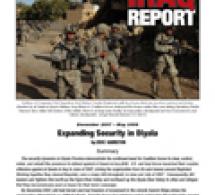 |
 |
Troop Surge Made Diyala Operations Possible
As reports of recent operations in Diyala and suicide bomber attacks make news, the Institute for the Study of War (ISW) this week released the latest Iraq Report that focuses on security efforts in Diyala Province over the last year. [ read more ]
The report, authored by ISW researcher Eric Hamilton, begins with Coalition and Iraqi Security Forces operations in 2007 that focused on al Qaeda in Iraq (AQI) strongholds in the province. As part of the Diyala offensive, made possible by the troop surge, forces adopted a ‘concentric rings' strategy (a process of securing the population center by setting a security perimeter then gradually extending the security perimeter outwards) to establish and maintain security.
Responding to increasingly-effective Coalition operations, AQI shifted its tactics from Vehicle Borne Improvised Explosive Devices (VBIEDs) to a campaign of suicide bombers using men, women, and even handicapped persons. Coalition forces in turn adapted to the changing tactics. By targeting top AQI leadership and cutting lines of communication, AQI's suicide bombing network was disrupted.
Iraqi Security Forces were trained to take over security responsibilities in Diyala Province, and Sons of Iraq (SOI) groups proved to be an essential component of the Coalition security strategy. Building on the SoI program's successes, a series of meetings were set up between tribal leaders, army leadership, and local government to support reconciliation and development.
A carefully planned combination of kinetic and non-kinetic operations in the province cleared out AQI forces and replaced them with Iraqi Security Forces, reconciliation, and economic development. By clearing and retaining key areas, Coalition forces hope to see a gradual improvement in the quality of life for the citizens of Diyala province. Holding the terrain will be vital for security both in Diyala Province and in Baghdad.
In addition to the Iraq Report, ISW has hosted guest commentary by Fred Kagan on the Russo-Georgian conflict. Fred Kagan is a Resident Scholar for defense and military issues at the American Enterprise Institute. As things develop, be sure to check back for continuing updates on the situation.
